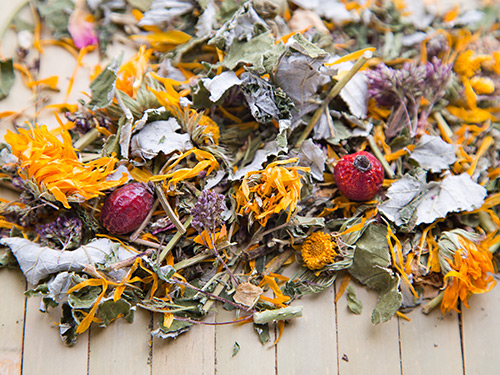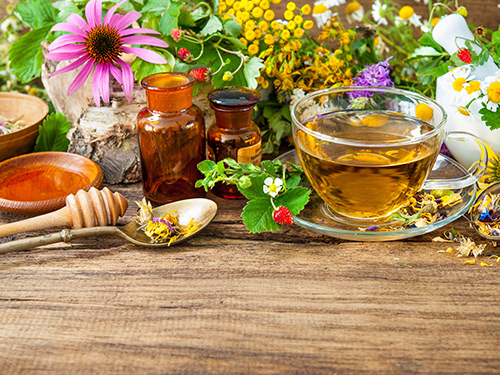Herbal Tea Benefits
Herbal tea benefits the body, mind, heart, and spirit whether it's hot or cold, iced or as punch, mixed with cream, milk, sugar, honey, syrup or lemon. People have enjoyed herbal tea for tens of thousands of years as an elixir of heath. Today it is used as coffee substitute, decoction, infusion, minitale, sun tea, tisane, iced tea or just plain room temperature. It's simple, easy to make and the health benefits are incredible. So step into the herbal apothecary with me where herbs are hanging up drying, plants are simmering on the stove and there's a cup of herbal tea steeping for you right now.

Herbal Tea Benefits one herb at a time
You receive herbal tea benefits with every kind of herbal tea you drink. Herbal teas benefit the digestive system, appetite, cramps, coughs, the common cold, nausea, heartburn, headaches and hay fever. Some herbal teas calm the nerves, promote sleep, lower blood pressure, fight infection, bring down a fever, cure insomnia, cleanse internal organs, strengthen memory, purify the blood or boost your immune system. And there are many herbal teas packed with vitamins and minerals, some carrying more nutrition than food.
There are teas that calm the nerves and can ease a conversation with a friend or loved one. By placing just one type of herbal tea into your cup, you get the singular benefit of what that plant offers. The more you steep it, the stronger your tea is, the more benefits you get. It really can't be overstated. The key to getting herbal tea benefits with one type of herb is to truly steep it long enough so that it has time to release all the benefits you need and deserve.
How long to steep it then? Let your herbal tea infuse into the water for at least 20 minutes or more. I recommend covering your tea with a top, cap or some other kind of flat and rather tight fitting lid. This supports deeper brewing powers.
Some herbs offer a plethora of benefits just by themselves. Ginger is a great example. When you drink ginger tea you are boosting your immune system, warming up your body, increasing your circulation and lowering your cholesterol all at the same time. There are many herbs that do this. The power of drinking one singular cup of herbal tea is simple, yet powerful and profound.
I'll add here that you're sure to get herbal tea benefits by slipping a bag of herbs into the bath. It's an approach that is not as well-known as drinking herbal tea, but can be just as potent. With an herbal bath you increase your blood flow, relax your muscles and tissues, calm your nerves, and bring peace to your body, mind, heart, and spirit. It isn't just hot water that does that. It's the power of herbs.
Complimentary herbal tea benefits
For those adventure seeking tea brewers out there, learning how to blend herbs comes from the practice of learning about herbs and discovering all the benefits they have to offer. Gradually as you continue to blend herbs, you blend herbal tea benefits, too. As you continue to taste herbal tea combinations, you'll learn how herbs work together. Discovering which ones bring out stronger flavors than others will help you determine the quantities you want from each of your herbs. Blended herbal teas often become the most beloved of beverages for many.
I once heard renowned champion herbalist Rosemary Gladstar state that "Herbal teas are the most effective for chronic health imbalances." I think she's right. We've been drinking tea for thousands of years and for many cultures, it was sipped and savored in small cupfuls several times daily. What this means is that we're working with herbal medicine on an on-going basis and from a place of cultivated, connected relationship with the plants.

A couple of great recipes I'd like to share with you are of some herbs that are both complimentary in taste and benefits.
The effects of a late night and/or poor night's sleep can be cured by brewing up a cup of 1/2 cup of thyme leaves, 1/8 cup of rosemary leaves and 1/4 cup of spearmint leaves in a quart of boiling water. Steep for 20 minutes or more and you'll step into your day feeling much better than you did the night before.
Achieving calm and peace starts with you. Soak 1/4 cup of chamomile flowers and 1/8 cup of peppermint leaves in 2 cups of boiling water. Steep 20 minutes or more and you're on your way.
Interested in more herbal tea recipes? Take a look at my article about them here.
The Best of Herbal Tea Benefits
Some of the very best herbal tea benefits come when we go out and gather herbs for tea. One autumn I went out foraging for herbal teas so that my family supply would be stocked for the winter season ahead. I gathered strawberry leaves and fruit, burdock roots, nettle leaves, St. John's wort flowers, blue berry leaves and fruit, wild ginger root, lemon balm leaves, a variety of mints, rosehips, raspberry leaves, elderberries, horsetail, red clover and bee balm flowers, dandelion root and mullein leaves to name a few. I learned so much about these plants in their different seasons and became so familiar with their habits and habitats that I became close friends with them.
Growing our own herbs for tea brings forth another realm of herbal tea benefits. Without fretting too much over it, I've dropped seeds into the ground with a blessing and prayed for sun and rain. Magically and mysteriously those seeds would sprout. Seeds like chamomile, mint, lemon balm, catnip, thyme, hyssop, echinacea, lavender and feverfew. It's deeply satisfying and alluring to step out to the garden and see what's happening each day to these tender herbal comrades and see how they're growing as well as be able to pluck a handful of leaves and step back in again to make a cup of tea.
Developing a relationship with the plants you're making tea with brings forth perhaps the best of the best herbal tea benefits. One of my most cherished fall rituals is foraging for dandelion roots. Once I've dug them up, I take them inside, wash and scrub them, roast them in the oven and store them for the rest of the fall and winter's tea. I can tell you I love those hardy taproots and how they ask for sensitivity when digging them up. Because their roots are deep down in the soil, if I'm not careful it's easy to break them with a shovel or by pulling too quickly. Over time I've discovered that through loosening the soil, often using a digging stick as my ancestors did, I'm able to unearth these roots whole. And it's worth it. Relationships are fostered with plants like this over time, just like we cultivate and grow relationships with our fellow humans.
Closing
When it comes to herbal teas, it's a big world out there. If you're new to herbal teas and what they offer, I recommend you start learning and get acquainted with one herbal plant at a time. If you've been on the path of herbalism for a while, get braver and learn about some herbs that you've never spent time with before. Here at the Twin Eagles herbal apothecary, may there be inspiration with every cup of herbal tea you drink. Where ever you may be on the spectrum of learning and gaining herbal tea benefits, I wish you an odyssey of discovery as you embark on your journey!
Additional Resources
- Rosemary Gladstar's Herbal Recipes for Vibrant Health by Rosemary Gladstar
- Peterson's Field Guide to Edible and Medicinal Plants
Interested in being personally mentored in Edible Wild and Medicinal Plants, on a transformational journey of connection to nature, community, and self?
Check out the Twin Eagles Wilderness Immersion Program.
comments powered by Disqus
Return from Herbal Tea Benefits to Edible Wild Plants
Return from Herbal Tea Benefits to Wilderness Survival (homepage)
Track Us